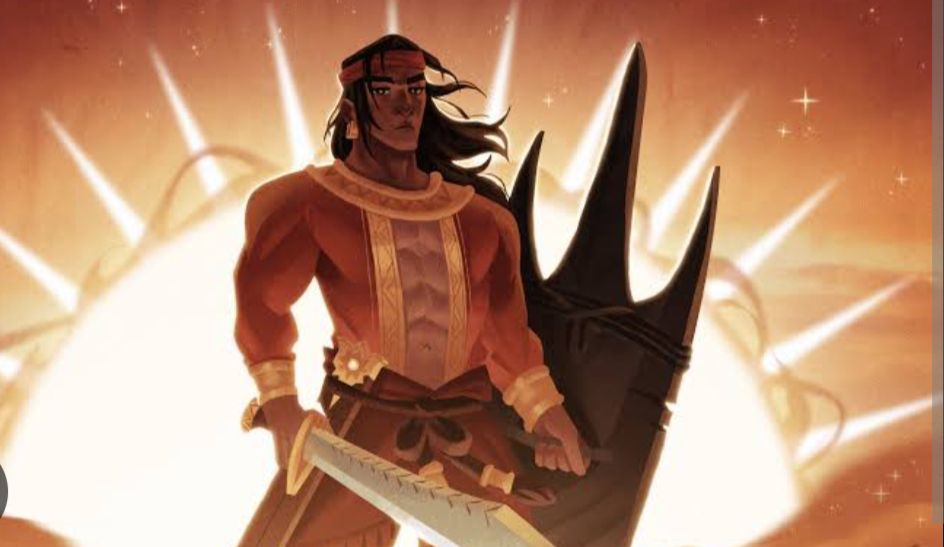Apolaki, The Sun God and War

INTRODUCTION|
Apolaki, the Sun God, holds a prominent place in the heart of Philippine mythology, serving as a divine embodiment of both warfare and the radiant sun. His stories shine as brilliantly as the celestial body he personifies.
Apolaki is profoundly venerated as the God of the Sun, symbolizing the essential journey he undertakes each morning, illuminating the sky and bestowing light and warmth upon the Earth. His presence is synonymous with vitality and sustenance, pivotal for nurturing crops and sustaining the daily rhythm of life.
The worship of Apolaki and other indigenous deities was of immense significance in the pre-colonial Philippines. These deities were not merely objects of reverence; they were also regarded as guardians and providers. The rituals and ceremonies connected to Apolaki held a central role in the social and cultural tapestry of numerous indigenous Filipino communities.
PHYSICAL TRAITS|
Apolaki is often depicted as a handsome young man with golden skin and radiant hair. He is adorned with the brightest of gold garments, symbolizing the brilliance of the sun. In one hand, he holds a shield to protect the world from harm, and in the other, he wields a spear, representing his role as the god of war. The spear is also symbolic of the sun's rays, which pierce through the darkness and provide light to all living creatures.
His presence is often accompanied by a halo of light, emphasizing his connection to the sun. This radiant halo signifies his divine nature and the warmth and vitality he brings to the earth. In some depictions, Apolaki is also shown riding a golden chariot, which represents the sun's journey across the sky.
FAMILY|
Apolaki's ancient origins are deeply rooted in the pre-colonial beliefs of the Philippines, well preceding the arrival of Spanish colonizers. Indigenous groups across the archipelago revered him, enriching his character and significance with their unique perspectives. He is said to be the son of Bathala with a mortal woman and the brother to the goddesses Mayari and Tala.
One of the most renowned tales in Philippine mythology revolves around Apolaki and his sister, Mayari, the Moon Goddess. Their relationship, while close, was marked by turbulence. Following their father's passing, they engaged in a fierce dispute regarding dominion over the Earth. Apolaki aspired to sole rulership, while Mayari staunchly advocated for equal rights.
This profound discord led to a violent clash in which Apolaki inadvertently struck Mayari in the eye. Overcome by remorse for his actions, Apolaki eventually agreed to a shared rule with Mayari. This captivating myth serves as an explanation for the sun's greater brightness in comparison to the moon, as it was in this conflict that Mayari lost one of her eyes.
OTHER NAMES|
Apolaki was particularly revered by the Tagalog and Visayan people, and his name is derived from the Tagalog word "Apó," meaning "elder" or "ancestor," which highlights his revered status.
POWERS AND ABILITIES|
Apolaki isn't confined to the serene role of a sun deity; he also commands recognition as a formidable god of war. His valor and strength on the battlefield are legendary, embodying the very essence of courage and heroism. Frequently portrayed armed and vigilant, he stands ready to shield his people from harm.
As the god of the sun, Apolaki's primary purpose is to bestow warmth, light, and life upon the world. In Filipino folklore, he is frequently depicted as a radiant and compassionate deity. His luminous rays serve not only to nurture the earth but also to safeguard it against malevolent forces and dark spirits. His warmth is believed to dispel sickness and infuse the land with vitality.
Yet, Apolaki's divinity extends beyond the sun's life-giving glow; he also assumes the mantle of the god of war. This dual nature, balancing the nurturing sun and the destructive power of warfare, underscores the complexity of his character.
This aspect of Apolaki harks back to the Philippines' pre-colonial history, marked by conflicts among indigenous groups. As the god of war, Apolaki was invoked by warriors and leaders prior to battle, beseeching his favor and guidance in times of strife.
His connection to warfare also signifies his association with courage, valor, and fortitude. Warriors would offer prayers to him, seeking strength and protection, firmly believing that his radiant energy would empower them on the battlefield. This warlike dimension solidifies his position as a central figure in Filipino mythology, epitomizing the dualities inherent in existence – life and death, creation and destruction.
MODERN DAY INFLUENCE|
In recent times, there has been a notable revival of interest in Philippine mythology and folklore, particularly in the reverence of deities like Apolaki. This resurgence is a testament to Filipinos' yearning to reestablish their ties to their cultural heritage. As a result, indigenous spirituality has seen a rekindling, and Apolaki's significance in the nation's history has been rediscovered.
Contemporary Filipinos are delving into the narratives and customs linked to Apolaki, acknowledging the importance of safeguarding and transmitting these cultural treasures to the generations that follow. This revival is manifesting in various forms, spanning from artistic and literary expressions to community festivities and educational undertakings.
Apolaki's stories transcend mere tales; they carry profound cultural import. These narratives impart lessons on equality, justice, and the importance of women's rights through Mayari's unwavering demand for shared dominion. Furthermore, they instill values of bravery and perseverance through Apolaki's indomitable spirit.
Bạn đang đọc truyện trên: AzTruyen.Top